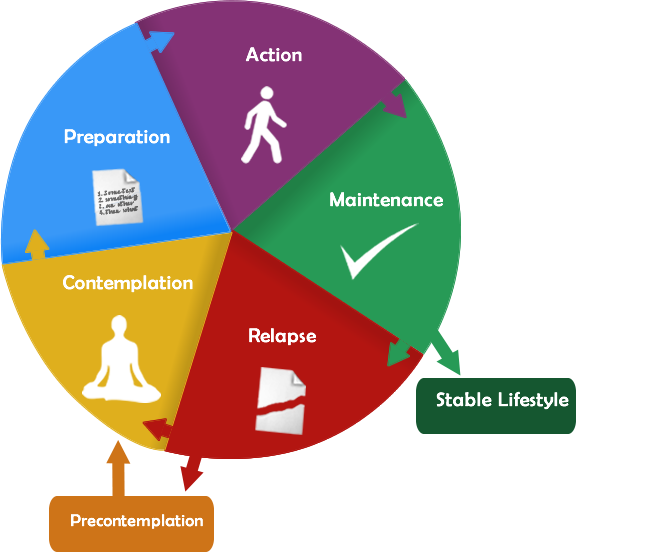How is MI used?
The aim of MI is to support patients as they move from ‘pre-contemplation’ where they are not considering change, to contemplation, then preparation, action and maintenance, with the hope of ultimately reaching a stable lifestyle through effective relapse management.
The stages of change model
The stages of change model, is really a model for understanding where your patient is ‘at’ rather than a tool for behaviour change. This understanding helps you to target your intervention appropriately. In the early stages, such as pre-contemplation and contemplation, you are more likely to concentrate on eliciting ‘change talk’ using motivational interviewing techniques. In the later stages you might move on to a brief behavioural change intervention, with goal setting and action planning, and explicit ‘what if…’ discussions around relapse management.
The graphic below illustrates how different members of the healthcare team can collaborate, however local circumstances will vary.
Hover over each of the labels/ titles below to see an example.

Action
"I’ve sat down with the practice nurse and set myself a goal for 5 kg weight loss in 4 months, and I have a written plan for the changes I’m going to make."
Preparation
"After talking with my GP I’ve decided to try to lose weight - they have asked me to keep an accurate 24-hour food and drink diary and book an appointment with the practice nurse."
Contemplation
"My GP broached the subject of my weight, and I can see the benefits of weight loss are beginning to outweigh the costs."
Relapse
"I have good weeks and bad weeks but I discuss the bad ones with the pharmacist and we work out how to get back on track."
Maintenance
"I’m weighing myself every week at my local pharmacist’s. They are helping me keep a track of my progress on a chart."
Stable Lifestyle
"I reached my goal and my GP was able to show me how my blood pressure has come down. I’m going back every 6 months for their Health Care Assistant to weigh me and monitor my blood pressure."
Precontemplation
"I’m not particularly bothered about my weight, but I’m open to a discussion about it."
Prochaska & DiClemente, 1983
Patient Scenario: Chetan

Patient Details
- Name: Chetan Chowdhury
- Age: 35
- Ethnicity: Bangladeshi
- BMI: 29
- Waist circumference: 98 cm
- Occupation: IT worker
- Family Background: Lives with his wife and mother who has type 2 diabetes.
- Last Appointment: Recently attended for support with smoking cessation.
Summary
Chetan recently attended for smoking cessation support. At that appointment you concentrated on his smoking cessation, but you managed to ‘broach and book’ a discussion about his weight. Like many young men, Chetan doesn’t often visit his general practice, so it was important to speak to him when the opportunity arose.
By listening to your patient, you can often tell where they are on the ‘Stages of Change’ model, and pitch your consultation appropriately. Patients in the pre-contemplation or contemplation stage are likely to benefit from motivational interviewing. Once patients reach the preparation, action or maintenance stages they are likely to benefit from a behaviour change consultation.
